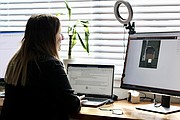The workplace through Gen Z eyes

Kirsten Rowley, 24, works as community lead for the Innovation Den. Rowley is in charge of planning, promoting and hosting events, including networking, finding speakers, marketing and more. She said she enjoys the flexibility of her schedule.
According to a Gen Z Spotlight Report, the youngest members of the workforce are rethinking the traditional 9-to-5 work week.
A Washington State University report released in April found that while about three-fourths of Gen Z employees feel it's safe to return to the workplace after COVID-19, almost half of them don’t feel ready to return to the in-person environment.
Although 67% of Gen Z employees think they're behind some of their coworkers and peers because they haven’t had the traditional office experience, 63% don’t think the traditional 9-to-5 office setting would work for them, according to the report. Many members of the younger generation prefer flexible work schedules with remote work options.
Another key finding: More than any other generation, Gen Z employees prefer to work for a company whose values align with their own. Seventy-nine percent of Gen Z employees surveyed said they only want to work for a company whose values align with their own. This is an increase of 9% from 2021.
According to the report, 92% of Gen Z employees said it's crucial to work for a company that cares about employee well-being, and 82% said diversity, equity, and inclusion are a must-have in the workplace.
The study also found that Gen Z employees place a great emphasis on training, with three-fourths saying that additional training for employees had a positive impact on their morale.
Corey Jeppesen, owner of Bahlr Media, an advertising agency in Coeur d’Alene, said he’s noticed a difference in the older and younger workforce. He said younger employees want to make a good paycheck to support their families and themselves, but he’s noticed it’s also very important to them to have a great work culture and atmosphere.
He said freedom in the workplace is also important for younger employees. Personally, Jeppesen said he prefers to trust his employees to do a good job rather than micromanage them, and that’s something that's important to the younger generation. If an employee were to break his trust, there would be consequences, but otherwise they would enjoy a free-flowing culture in a job that trusted them.
Jeppesen said he would much rather an employee work very productively for four hours and have the rest of the day off than work less productively for eight hours.
Kaleigh Joetz, 17, a student at Lake City High School, works at Gelato by the Lake in downtown Coeur d’Alene. She said she prefers the in-person work experience.
“I personally really like the in-person, especially here,” Joetz said. “It’s really fun. You get to meet a lot of new people and build relationships, and it’s definitely nice to be able to work with coworkers and learn how to work with coworkers.”
Joetz compared online work to online schooling, and said she felt that she just learned a lot better in-person.
Because she's still in high school, Joetz said she isn’t too concerned about the values of a company that she works for; finding work that fits her after-school schedule is key.
Training is another thing she thinks is important when approaching a job. Joetz said she knows a lot of employees have struggled with having the resources to do their positions because training and prior experience have not been required as businesses were trying to hire enough employees.
For 24-year-old Annie Zasadny of Coeur d’Alene, variety is the spice of work life.
“I just love variety,” Zasadny said. “The one time I did have a 9-to-5ish job, my least favorite part was just kind of like day-in-day-out sitting in the office. It would get pretty routine and dull.”
Zasadny works as a waitress two days a week, is a videographer two other days, and then works on the side with her own photography gig as well as on weekends as an onsite coordinator for a wedding venue downtown.
Zasadny said she likes the option of being able to do several different things a week versus working a stationary 9-to-5 position. She said the flexibility of being able to work remotely for some of her jobs, and then working in a social environment for others, is a good balance for her.
She said she’s learned a lot from her in-person job recording video, and she prefers jobs that teach her new skills that are valuable for her future.
Zasadny agrees it’s important to work for a company whose values, mission and goals align with hers.
“I feel like with every place I work for, I can look for the positive aspects, but I can also get discouraged with the negative aspects,” she said.
She said she also likes to work for and with people who share mutual respect for each other, as well as have a job that she finds meaningful.
With waitressing, Zasadny said she sometimes feels like it’s “just a restaurant,” but then there’s a whole other aspect of the job where they make a lot of the food in-house and really care about their customers, making the restaurant a place where people enjoy time together. Zasadny said focusing on those aspects can make the job more meaningful.
Silas Phillips, 25, of Coeur d’Alene starts his day with coffee and breakfast, then works from his home office.
“What I love is just being able to take care of the things that I need, to play with my dog or do my laundry or clean the house while I’m waiting on stuff,” Phillips said. “Having that flexibility is really important to me.”
Phillips is running his own freelance video production business, North Motion Media. Previously, Phillips worked for two other companies doing video editing in the traditional 9-to-5 work setting.
Despite cool office space and coworkers and a relaxed environment, Phillips said he could only handle working 9-to-5 for a year and a half.
“I was doing what I love and the content that I was making was what I like to do. It was how I like to spend my day, but being tied up in that setting despite having a cool working environment, I was still having to go in 9 to 5 and didn’t have free time,” he said. “(I) really wasn’t able to take care of things that I needed to outside of work.”
Phillips said what he dislikes about a 9-to-5 job is even if salaried, employees are still expected to show up a certain amount of hours and days during set times versus just getting tasks done by the deadline.
“By keeping you in this box and being like, ‘Yeah, we want you to get this done on time, but you have to do it within our standards and our practices,’ that doesn’t make any sense to me,” Phillips said. “So it just feels like this kind of control that a company instills over its employees by working that way.”
Phillips said because of the flexibility issue, he really didn’t enjoy the job. Now self-employed, he said his flexible schedule leads to greater productivity. He said he also likes to have the option to stop work if something comes up unexpectedly, unless he has a deadline to meet.
While he finds himself more productive with a flexible schedule, Phillips said it’s also just as important to have a team to hold you accountable. With a remote work environment and flexible schedule, he said it can be easy to be less productive than in the office.
“Having some sort of accountability is very important and accountability is pretty easy to put in place virtually,” Phillips said. “I think that it would make sense to work from home but you still have the accountability of someone watching you from the office.”
He also thinks it’s important to work for a place that aligns with his values, doing work that's important to him.
Camryn Buck, 21, has been working for the Cd’A Garment District, a boutique in downtown Coeur d’Alene, for seven years. She said she prefers working in-person because she likes the social aspects.
“I’m a pretty social person, pretty bubbly, so I like to talk to people and hang out and interact,” she said.
Buck said the importance of having a flexible schedule depends on what job she’s working. If she were working remotely, Buck said she would definitely want to find a job that allowed for more flexibility. She said she prefers working earlier in the morning and getting off earlier, especially in winter because it gets dark so early.
She said she thinks employee trainings or monthly get-togethers are beneficial, and that it’s important to work for a company she agrees with.
“I wouldn’t want to work for someone that I wouldn’t agree with their morals or what they’re working toward,” Buck said.
Kirsten Rowley, 24, said she’s always worked in the hospitality and service industry, starting out as a hostess at Dockside in Coeur d’Alene. Prior to her current job, she worked at Dutch Bros Coffee for six years, moving up to manager.
In her new role as community lead for the Innovation Den, Rowley is in charge of planning, promoting and hosting events, including networking, finding speakers, marketing and more. She said she enjoys the flexibility of her schedule.
“There’s a lot of freedom,” Rowley said. “It’s kind of just managing myself and my time, and being responsible for the things that need to get done to deliver excellence in all of the events that I have to host.”
While Rowley has the option to work remotely and with a flexible schedule, she said she prefers to set a schedule for herself for stability, and will usually work at her office in the Innovation Den Monday through Friday.
She said there are pros and cons to both work environments. She likes to work in the community with a consistent schedule but with the freedom that her current job offers more than an in-person office job that runs 9-to-5.
As far as values go, Rowley said she feels strongly about working for companies whose values align with her own.
“Having to feel aligned with either the vision, the mission, the culture or something of a company is really important to me,” she said. “I would rather work anywhere for loving what I did and feeling proud of that than money.”
Rowley said she really enjoyed her job at Dutch Bros Coffee because she liked what the company stood for and how they treated their employees, and that’s what kept her there for six years. She said after learning what her new job paid, she still took the time to make sure the company was one she wanted to work for based on their values.
“I wanted to make sure that I’d be giving it my all and that I believed in what we were doing,” Rowley said. “That's very, very important to me.”
Rowley said one thing she really appreciates in job environments is when employers are respectful and thoughtful of their employees' needs, such as if they need fewer shifts one week because they have important things in their personal life going one.
She said she appreciates when employers offer training for the job positions as well. She said she's also drawn to companies that will hire employees not just based on skill, but also on their personality and trusting their intuition about that person’s energy and ability, offering training to get their employees to the needed skill levels.
“That would be something that for me creates longterm loyalty,” Rowley said.
Ashley Murphy, 25, of Coeur d’Alene is a training specialist for ADT Solar. She works remotely from her home, training representatives. She has a set work schedule every other week, spending the alternating week answering emails.
Murphy said she misses the social interaction of an in-person job, but enjoys working from home because of the flexibility and option to choose a break when she needs one.
She said she appreciates how companies in Europe give employees shorter hours and more paid vacation time. She said quite frequently, she’ll meet travelers from Europe who are on paid vacation for over a month.
“I feel in America … we work to live, to die,” she said. “I would say that flexible hours are better I think for people's health, for just our overall quality of life.”
Jeppesen said he thinks a job should be a vehicle to the fulfillment of the personal life of a person working for the company.
“The reason we go to work is so that we can be happy in our lives,” he said.
Jeppesen said he loves to hire younger people because they're more apt to see how the world is changing. He said they're also creative and more open to new ideas, thinking outside the box.
“They’re always adaptable, willing to change and willing to get better and improve,” Jeppesen said. “I like to have employees that innovate. I think younger people are more innovative because how fast the world has changed and it continues to change so fast, and when you’re young you accept that change a little easier.”















